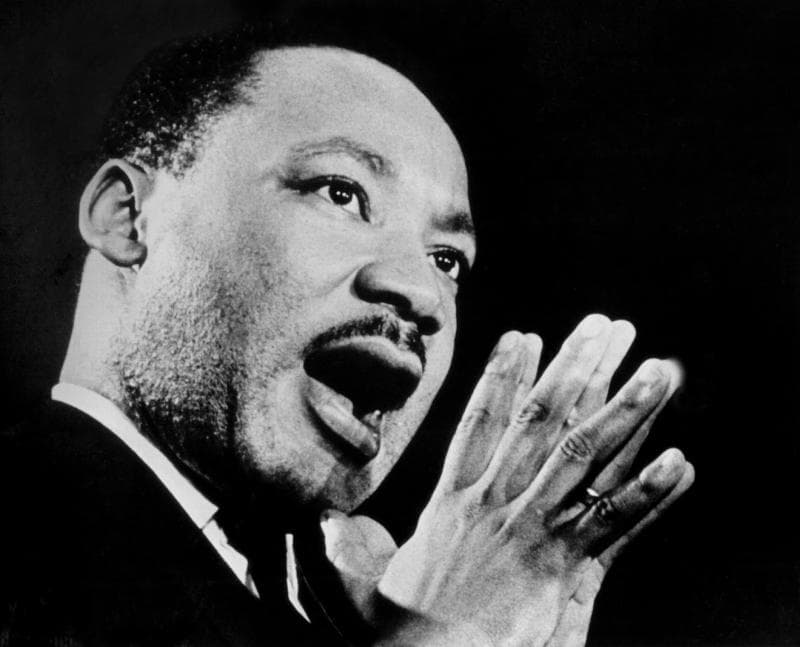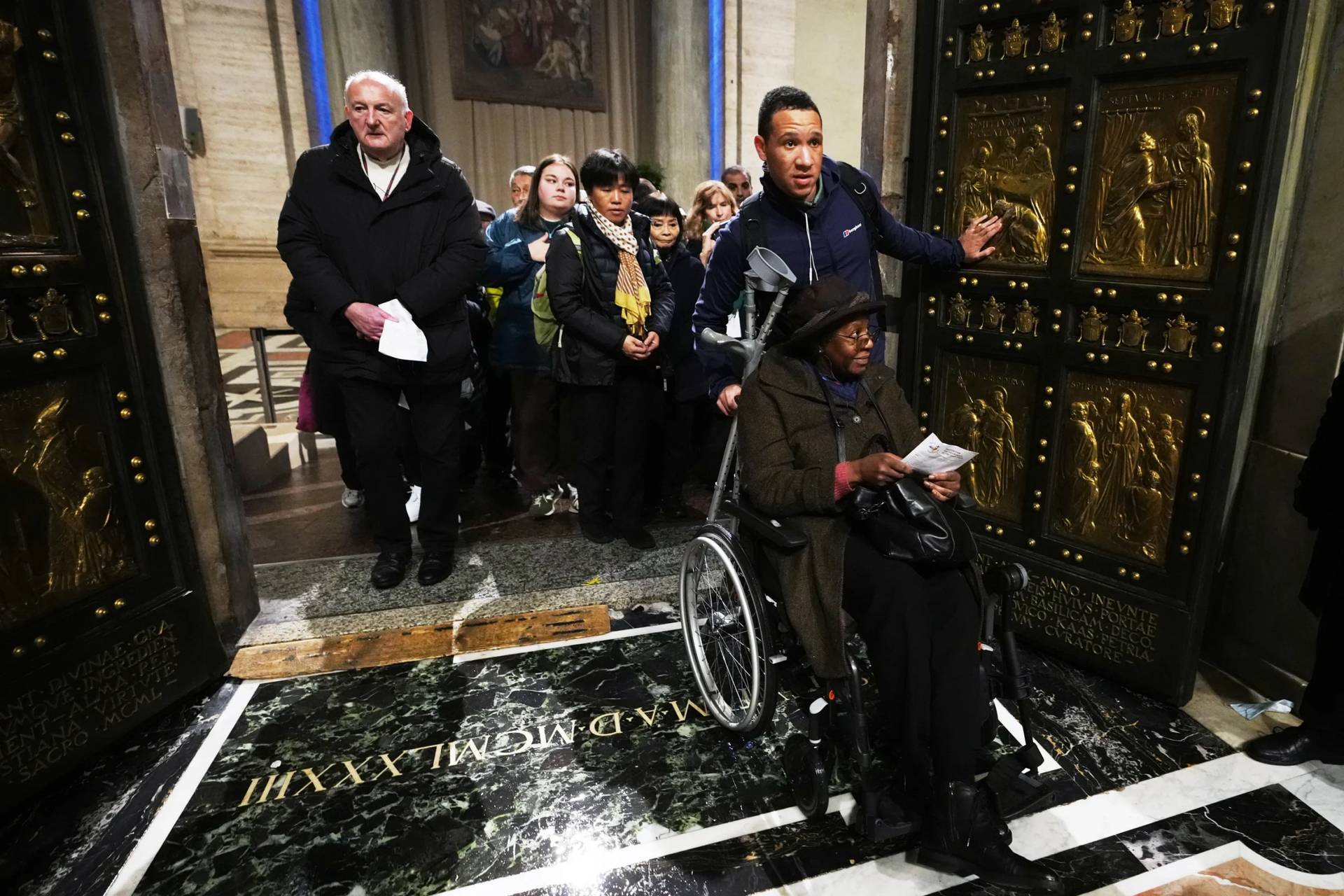ROME – As Americans mark what would have been the 92nd birthday of Dr. Martin Luther King Jr. amid a social and political climate laced with historic levels of vitriol and division, the late civil rights legend offers a message that also hits close to home for Pope Francis.
Throughout his eight-year papacy, Francis has pointed to Dr. King as a model for how to respond to hatred and the social upheaval it can cause, repeatedly praising King’s policy of nonviolence and his insistence that love outweighs whatever divisions might stand in the way of brotherhood.
As the latest example of his affinity for the minister-turned-activist who was assassinated in 1968, Pope Francis blessed a jersey, a gift from the Atlanta Hawks basketball team, on Jan. 15, the anniversary of Dr. King’s birthday. Black with gold trim and lettering, the jersey bears the text “Francis 1” on the back, and “MLK 1” on the front.
The team will debut the jerseys during their match against the Minnesota Timberwolves Jan. 18, on Martin Luther King Day, a US holiday which is always celebrated the Monday after King’s birthday. Profits from jersey sales will go directly to the Atlanta community.
In a video released on the team’s Twitter account Jan. 15, Pope Francis, a sports enthusiast, opened his gift and showed off both sides of the jersey before blessing and signing it.
According to the NBA’s website, the gift comes after five NBA players – Marco Belinelli, Sterling Brown, Jonathan Isaac, Kyle Korver, Anthony Tolliver, and NBA Players’ Association executive director Michele Robert – traveled to the Vatican for a private meeting with Pope Francis in November to talk about social justice.
At a time when social tensions in the United States seem to be at a boiling point following a summer of racial tensions, an ongoing economic crisis related to the coronavirus pandemic, and a political crisis after the Jan. 6 breach of the US Capitol and ahead of Joe Biden’s inauguration as President Jan. 20, Dr. King’s message rings as especially potent.
Pope Francis himself has consistently referenced King and his advocacy as a remedy for modern social tensions.
During Pope Francis’s October 2015 visit to the United States, Dr. King was one of four American “heroes” the pope highlighted in his speech to US congress who he said offered the world a way “of seeing and interpreting reality.”
“That dream continues to inspire us all,” he said. “I am happy that America continues to be, for many, a land of ‘dreams.’ Dreams which lead to action, to participation, to commitment. Dreams which awaken what is deepest and truest in the life of a people.”
A few months later, when the pope’s post-synodal exhortation Amoris Laetitia was published in April 2016, Dr. King’s name appeared again in a section of the document reflecting on how love is resilient even amidst trial and difficulties.
In this section, the pope wrote that he was reminded of Dr. King, “who met every kind of trial and tribulation with fraternal love.”
He then quoted several portions of Dr. King’s speech 1957 sermon at Montgomery’s Dexter Avenue Baptist Church, saying, “The person who hates you most has some good in him; even the nation that hates you most has some good in it; even the race that hates you most has some good in it.”
In an address several months later given to members of world popular movements in Rome for audience at the Vatican just three days before the US presidential election that sent Donald Trump to the White House, Francis again referenced Dr. King.
He warned attendees not to succumb to fear, which he argued, “weakens and destabilizes us, destroys our psychological and spiritual defenses, numbs us to the suffering of others,” and in the end “makes us cruel.”
Instead, he pointed to Dr. King as the antidote, saying the activist “always chose fraternal love, even in the midst of the worst persecution and humiliation.”
Again quoting King’s Montgomery sermon, Francis said that “Hate for hate only intensifies the existence of hate and evil in the universe. If I hit you and you hit me back and so on, you see, that goes on ad infinitum. It just never ends.”
“Somewhere somebody must have a little sense, and that’s the strong person,” he said, adding, “The strong person is the person who can cut off the chain of hate, the chain of evil.”
In 2018, Pope Francis twice received King’s daughter, Bernice Albertine King, in a private audience at the Vatican – once in March when King came to Italy to receive an award, and once in October when she participated in a conference organized by the Italian Community of Sant’Egidio titled, “Bridges of Peace.”
During the March visit, King gifted the pope a copy of the 6th volume of a series titled. “The Papers of Martin Luther King, Jr: Advocate of the Social Gospel, September 1948-1963.”
In an interview with Vatican News in June, just one month after the killing of an African American man named George Floyd by a white police officer who knelt on his back and neck for nearly nine minutes, King said she believes Francis and her father share the same dream.
Pope Francis in a June 3 general audience address referred to the social unrest in the US after Floyd’s death and the mass protests that ensued, criticizing both racism and the violence that erupted during several of the demonstrations.
“We cannot tolerate or turn a blind eye to racism and exclusion in any form and yet claim to defend the sacredness of every human life,” he said, but added that at the same time, “we have to recognize that the violence of recent nights is self-destructive and self-defeating. Nothing is gained by violence and so much is lost.”
In her interview with Vatican News, King said she agreed with Francis’s remarks, insisting that “our means must cohere with our desired end, and if that desired end is peace, we certainly cannot achieve peace with violent methods.”
Follow Elise Ann Allen on Twitter: @eliseannallen












